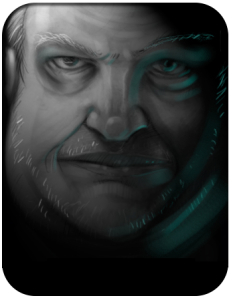DETECTIVE MOXLEY, Part 1: “He Died Hard”
 “Well,” said Moxley, “he died hard. No argument there.”
“Well,” said Moxley, “he died hard. No argument there.”
Siengold narrow-eyed the detective for all he was worth. Siengold was a Goop; he was supposed to hate private detectives. Like so many of the government operatives, however, he took real pleasure in this particular unspoken tenet of his job. Around the two men, a pair of forensics drones hovered on fitful turbofans, their imagers strobing away as they indexed the crime scene. A pair of Siengold’s subordinates milled in the hall outside the storage unit, working hard to win a glaring contest. The subject of their competition was Harold Moxley and they wanted very much for the detective to know it. Moxley pretended he did not notice, more from spite than from diplomacy.
Moxley squatted with some difficulty, holding the hem of his overcoat so it would not drag through the pool of blood. The crimson puddle was congealing. There were portions of the polished floor to which the blood had been burned, almost cooked, which was consistent with the incinerator pistol lying on the floor. Most of the man’s body had been blown to atoms by the blast. The contents of his pockets — protein bars, empty wrappers, and burst pouches of sucrose-water, had been scattered around the storage locker by the explosion.
Some of the scraps of fabric had once been slacks. Moxley identified a pair of belt loops, although nothing that looked like a belt. The largest part of the dead man’s body still intact had once been his face. Moxley realized he was staring at the back of the man’s eye holes. The heat wave of the incinerator had lifted the face off like a mask and dumped it on the floor. He had seen that once before.
“This mess,” said Siengold, following Moxley’s gaze, “is why only a moron kills himself with an incinerator.” He seemed to think he was being clever.
“Lieutenant,” said one of the men in the hallway. “His time’s up.”
“Let’s go, Mox,” said Siengold. “You’ve had your twenty minutes.”
“I’ve got a contract,” said Moxley. “You and your bully boys can just wait for me. Unless you’d like to explain a breach to the Labor Board? No? Then back off and let me do my job. Maybe learn something.”
Siengold glowered at him. One of the Goops in the hall sniggered. Moxley was used to that. He knew how he must seem to them — old, broken, fifty pounds overweight, his moon-shaped face pocked and scarred. He was hairy every where a man should not be, bald everywhere it counted, and he hadn’t shaved in three days. His overcoat was stained and his hat was lived in. He was a squat, broadly built man, stronger than he looked, with gnarled hands and tired eyes.
And he was still a better Detective than any five of these goons.
Keep telling yourself that, he thought. Maybe it’s true.
“Did the drones type and print the gun?” asked Moxley. “Who found the body?”
“No prints,” said Siengold. “The doors on these units aren’t hermetically sealed. There’s enough clearance that blood from what’s left of the body seeped out into the corridor. The manager comes in once a week to do billing in the front office. He saw the puddle and called it in.”
Mox looked up from where he was kneeling. “No prints,” he repeated. “On the gun this man used to incinerate himself. Which he then dropped because there wasn’t enough left of him to hold it.”
“Yeah,” said Siengold. “We figure the heat of the blast did it. There’s no DNA, no skin oil, nothing on the pistol. I checked with Central’s armorer. He said there’s precedent.”
Mox didn’t like it. He looked back to the two Goops eye-balling him from the hallway and his gaze followed the perimeter of the storage room door. “Magnatic locks?” he said.
“Sealed from the inside,” said Siengold. “The whole system’s controlled by a pocket AI in the front office. Nobody’s opened the door since this poor bastard locked himself inside. He was in here for a while, judging from the water and the protein bars. Might have been a squatter.”
“A man so poor he’s living in somebody else’s storage locker,” said Moxley, “who just happens to have an illegal pistol worth five hundred in hard plastic, easy.” He shook his head. “What’s in these boxes?” He gestured to the few pasteboard crates haphazardly strewn about the storage locker.
“Machine parts,” said Siengold. “That’s all they store here. It’s some kind of archive for an R and D microfactory at the edge of the Redlight.”
“You check the other units?” Moxley braced his hands against his thighs and pushed himself to his feet.
“That a trick question, Moxley?” Siengold said. “Bylaws say we can check the adjacent units, so we did. Nothing.”
“Just checking,” said Moxley. “My client is the holding company that owns this joint. Well. Their insurance company.”
“Sounds very civic-minded,” said Siengold. “If you ask me, dissolving the freecops was the smartest thing the city council ever did. Pay to play may be what Hongkongtown was built on, Moxley, but it makes for piss-poor justice. Police for the folks who pay and not for the others? That isn’t equal rights.”
“You strike me as a paragon of equity,” said Moxley. “Fortunately, the law that changed freelance policing has nothing to say about commercially employed private detectives.”
“Not yet,” said Siengold. “Give it time.”
Moxley swallowed one of his better insults. His eyes went to the walls, just below the ceiling. The only opening was a circular grate no wider around than his wrist.
“This goes next door?” Moxley asked.
“I told you, we checked the adjacent unit,” said Siengold. “You think he was murdered by a cloud of smoke? Not even a Squeeze could fit through there, Moxley.”
“I wouldn’t know,” said Mox. “I’ve never seen one.”
“They picked up two of them just last month,” said Siengold. “Hiding in a laundry off Shenzhen Boulevard. Human Services has been working with our joint government task force. There are a lot more Ogs in Honkongtown than anybody thought.”
“So I keep hearing,” said Moxley. “Maybe you should be focusing on Sleepers instead of Augments. There were three more wildings this week, Siengold. What are the Goops doing it about it?
“Don’t use that word with me,” said Siengold. His voice was sharp. Mox had to remind himself that this man had real power, no matter what the detective thought of Siengold’s character.
“Street slang,” said Moxley, turning back to the body. “I spend a lot of time dipped in it.”
“That’s what I hear,” said Siengold. “Been through the Redlight recently, Moxley? Funny thing. Flowers says you owe them like five large. Had a look at your credit history lately?
Moxley waved a middle finger at him. “I was out with your mother. She has expensive tastes.”
“Eat it,” said Siengold. “Finish up and get out of my sight. I want to seal this scene and get back to the office.”
“In a minute,” said Moxley. He fished the scratched disc of his phone from his pocket, licked the back, and pressed it into his palm. He ignored the face Siengold made. The beleaguered phone adhered, finally, and Moxley held his palm up to take a photo. Using the metal stylus he carried in his shirt pocket, he reached out to flip the scrap of face over.
The Goops had a DNA database and couldn’t care less about facial recognition, but Mox’s own database was a bit more antiquated. His image processing equipment might be able to pull up an identity and might not. It was worth a shot. If he failed, he would have to pry the information out of Siengold or, more likely, bribe a middle-man to pay the Goop for the information.
The blood-soaked skin unfolded. Its lips were flat and blue. Even without a skull behind it, the features were unmistakable.
“Oh my God,” said Moxley.
The face belonged to Raymond Neiring, his only friend.

